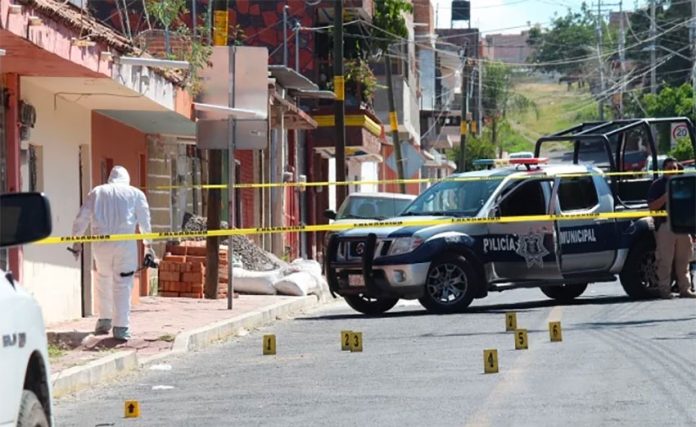Mexico suffered its most violent year on record in 2019 with homicide numbers increasing 2.48% to more than 34,000, official data shows.
Statistics published Monday by the National Public Security System (SNSP) showed that there were 34,582 victims of intentional homicide last year, 839 more than the 33,743 victims in 2018, which was the most violent year since national records were first kept in 1997.
The number of femicide victims increased 10.3% to 1,006 in 2019, bringing the total number of people slain to 35,588, a 2.7% increase compared to 2018. Veracruz and México state recorded the highest number of femicide cases.
SNSP data also shows that authorities opened 29,401 homicide investigations last year, a 1% increase compared to 2018. The number of investigations is lower than the number of murder victims because two or more people were killed in some cases.
Just under 70% of homicides were carried out with firearms, many of which were likely brought into Mexico from the United States.
The statistics underscore the security challenge faced by the federal government led by President López Obrador, who has promised to bring peace to Mexico by addressing the root causes of violence such as poverty and lack of opportunity rather than pursuing the same confrontational security strategy implemented by his two most recent predecessors.
He conceded last week that his administration has not yet made progress in reducing crime and violence but reasserted that “there will be a solution.”
One positive among the grim news delivered by the SNSP is that the increases recorded between 2018 and 2019 for both the number of homicide cases and victims were the lowest in recent years.
The 1% uptick in the former is dwarfed by the annual increases recorded in 2018, 2017 and 2016, when the number of murder cases rose by 16%, 24% and 25% respectively.
Similarly, the annual increases in the number of homicide victims in recent years – 17% in 2018, 28% in 2017 and 26% in 2016 – are all much higher than the 2.48% hike recorded in 2019.
Still, the homicide numbers remain stubbornly high, ratcheting up pressure on the López Obrador administration to change its approach to combating violence.
“. . . They need to abandon cowardice in decision making,” said Gustavo de Hoyos, president of the Mexican Employers Federation.
“Events like those in Culiacán cannot be accepted again,” he added, referring to the decision to release a son of Joaquín “El Chapo” Guzmán after the Sinaloa Cartel responded violently to his arrest in October.
López Obrador and other government officials have expressed confidence that the National Guard, a new security force considered the centerpiece of the government’s security strategy, will help to reduce violence in Mexico.
However, the national deployment of the force on July 1 did nothing to stem the bloodshed: in fact, the number of victims of homicide and femicide in the second half of the year was 1.8% higher than in the first six months.
Amid the ongoing violence, the government faced criticism for using thousands of guardsmen to increase enforcement against undocumented migrants rather than to tackle the high levels of violent crime plaguing many of Mexico’s 32 states.
In sheer numbers, Guanajuato was the most violent state in the country last year, with 3,540 homicide victims. A bloody turf war between the Jalisco New Generation Cartel and the Santa Rosa de Lima Cartel over control of fuel theft, extortion and kidnapping is considered the main driver of violence in the state.
The next most violent states were Baja California, México state, Jalisco and Chihuahua, where the number of homicide victims ranged between 2,859 and 2,554. More than 2,000 people were also murdered in Michoacán last year, while victim numbers exceeded 1,500 in each of Guerrero, Veracruz and Mexico City.
In per capita terms, Colima was again the most violent state, recording 98.34 intentional homicides per 100,000 residents. The figure is more than three times higher than the national per capita rate of 27.32 murder victims per 100,000 residents. Baja California, Chihuahua, Guanajuato and Morelos recorded the next highest per capita rates.
The least violent state in the country both in terms of the number of homicides and the per capita rate was Yucatán, where there were just 33 murders in 2019.
Other crimes that increased in 2019 included extortion, domestic violence, human trafficking and drug dealing. The number of kidnapping cases fell 0.5% to 1,322 but the number of victims rose 3.5% to 1,614.
Source: Milenio (sp), El Financiero (sp), El Universal (sp), Aristegui Noticias (sp)
